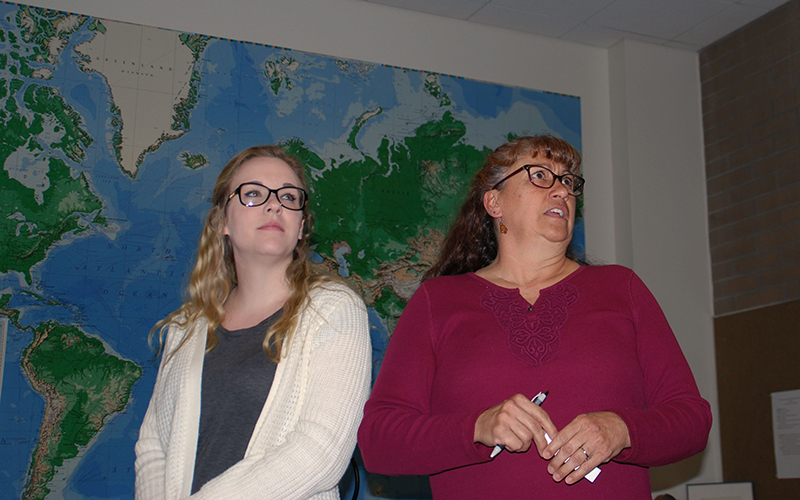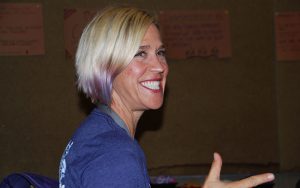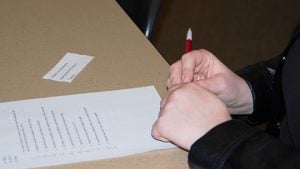
Vernessa Mooney, (left) and Kathy Nicholson are learning to become teachers. They joined a mentorship program that is a partnership between the Paradise Valley School District and Paradise Valley Community College. (Photo by Keerthi Vedantam/Cronkite News)
PARADISE VALLEY – In a poorly-financed education system, Arizona teachers are battling low salaries, the pressures of mandatory testing and a lack of respect for their profession, making it harder for the state to entice and retain teachers, advocates say. One Paradise Valley mentoring program is trying to grow teachers at home and repair a broken pipeline.
Teachers who teach future teachers
Volunteers in Paradise College Corps, a mentoring program that pairs college students who are aspiring teachers at Paradise Valley Community College with teachers in the Paradise Valley School District, was created in 2013. Laurie Smith, a former teacher and the corps program coordinator at the district, brought the opportunity to Meggin Kirk, education program director at the community college, who decided to implement it into her syllabus as a course requirement.
“The hope was to bring the community into education,” Smith said. “Teachers will remain in the profession if they are teaching in the community where they themselves grew up and went to school.”
Earlier this year, a task force with the Arizona Department of Education called attention to the ongoing issue of teacher retention. The group’s report encouraged local education groups to implement “grow your own” programs to address a teacher shortage where one out of four positions in Arizona go unfilled.
Gov. Doug Ducey proposed an Arizona Teachers Academy to reduce student-loan debts for Arizona college graduates who stay in Arizona to teach.
“I’m looking for the best and brightest to commit to teach in Arizona public schools,” Ducey said in his annual State of the State address this week. “If you make that commitment, we’ll make this commitment: your education will be paid for, a job will be waiting and you will be free of debt. Let’s lift this burden from our teachers, attract new quality individuals into the classroom.”
Other states are pursuing a home-grown model in hopes of spurring retention. South Carolina offered a teaching program in 2015-16 in more than 80 percent of its high schools and provided financial aid to college students who were studying teaching at South Carolina colleges.
Every semester, Smith and Kirk have about 60 community-college students in the program who are studying to become teachers. Each one is paired with a mentor, an elementary-school teacher in the school district.

Meggin Kirk, director of the education program at Paradise Valley Community College, says students in its mentoring program are more likely to teach in Arizona when they graduate. (Photo by Keerthi Vedantam/Cronkite News)
The program replaces the conventional observation hours needed for a teaching degree, which requires student teachers to observe a classroom for 12 to 30 hours a semester, depending on their specialization.
“In a lot of cases, schools, universities just send students out to find their own placements and they might go in for a few days all day long and just sit,” Smith said. “What we do is we match each one of her students with one of our teachers and they go on a regular basis.”
The matching process pairs the student teachers with experienced teachers who have similar backgrounds and goals. Michael Guzman, one of Kirk’s students, is a security guard who is changing careers.
“I matched him with a male teacher who did the same thing…he re-careered,” Smith said. Student teachers are “not just observing, they’re also working with students, they take a lot of responsibility. Our elementary students are receiving academic support.”
The student teachers spend two to three days a week in the classroom for a semester.
“You have this young, inspired, passionate new person who comes into the classroom,” Kirk said. “Teachers love that. Because there is a teacher shortage in Arizona, there’s a sense of responsibility for making the teaching profession, bringing students into the teaching profession.”
Why it’s hard to keep good teachers in Arizona
The Arizona School Personnel Administrators Association collected data from 130 school districts and charter schools in Arizona at the beginning of the school year that showed 25 percent of teacher positions were not filled. And new teachers are particularly vulnerable: the data also showed 465 teachers did not return to work as teachers after the first four weeks of the school year.
Guzman and Matthew Logelin, two Arizona natives who went to public schools in the state, are walking into the education job market knowing the challenges. They say low salaries, mandatory tests and a lack of respect for the profession (“We respect our doctors and lawyers, but who taught them?” Logelin says) play into why so many people are leaving the education field.
“Teacher compensation is number one,” said Justin Wing, past president of the administrators association.
A study conducted by MIT in 2015 said the Phoenix teacher’s hourly wage was around $8 more than a study local poverty wage of $11 per hour. The Arizona Department of Education’s retention and recruitment report said the average educator’s annual salary in 2015 was $39,970, or $15,720 more than the year’s federal poverty guideline for a four-person household.
Wing, whose family was poor and moved often, is director of human resources in the Washington Elementary School District but avoided becoming a teacher.
“I was really good at math in high school and college,” he said. “But I knew I never wanted to be a math teacher because in my mind they didn’t pay enough.”
Mandatory tests like Common Core and teachers getting less respect also affect the teacher recruitment and retention cycle, Kirk and others say.
“It blows my mind that this profession, which we all know is so important, doesn’t get the kind of glory it deserves,” Kirk said.

A student teacher takes a test at Paradise Valley Community College. The college collaborates with the Paradise Valley School District to mentor students learning to becoming teachers. (Photo by Keerthi Vedantam/Cronkite News)
Inspiring teachers to stay in Arizona
The mentorship program in Paradise Valley can counter low morale by engaging student teachers, Wing said.
“What happens is they get into a classroom with a teacher who really inspires them, someone they can admire, someone who obviously is enjoying the profession,” Smith said.
Despite the challenges, Logelin and Guzman are adamant about staying in Arizona and advocating on behalf of teacher groups to improve education.
“You are impacting people everyday,” said Logelin, who plans to graduate in 2017 with a bachelor’s degree. “I could probably get a call center job that pays more and is less work. But you get to go to work everyday knowing you can change lives.”
Logelin, who says he encountered bullying and has a learning disability, wants to teach fourth grade after having quality teachers who enriched his school experience.
“That’s when I was diagnosed with my disability, and I had an amazing teacher who helped me through it,” he said.
Guzman, a single father whose daughter is in a special education class, is also pursuing a master’s degree in child psychology. He wants to teach children with special needs. He said the program strengthened his resolve to stay in Arizona and help children who grew up Arizona, just like he did.
“I know these kids. I was one of these kids,” Guzman said. “I can relate to them, and it just strengthens the community.”
Karen Merkley, Phoenix teacher: I was inspired to become a teacher because of the influence of caring teachers from my childhood, but what really sealed the deal was a speaker I heard in 7th grade. I don’t know his name, but he was a WWII Holocaust survivor and said something so profound it still rings in my ears regularly. He told his story about how the perpetrators of the Holocaust had all been well-educated people and left us with the parting statement that we need to “do more than just teach humans. We must teach them to be humane and what it means to be human.
Joseph Cyr, Tucson teacher: As a language teacher who grew up, bi-racial, in a household where neither parent spoke English as their first language, I learned early on how another language is not only a path to other worlds but also a powerful tool to ‘see ourselves as others see us.’ I wanted to help others to to have access to those different world-views as well, so I became a foreign language teacher. Moving to AZ from the Seattle area, I still love teaching, but I cannot in good conscience ‘recommend’ teaching to young people just starting on their careers here in AZ; wages are so low, with practically no hope of ‘moving up,’ due to ‘freezes’ and de facto meaningless ‘salary step schedules’ in the metro Tucson area, not to mention inadequate textbooks and technology. For new teachers who have student debt and who hope to have a family, I am very pessimistic. We need good new teachers, but for the moment, they’re understandably heading elsewhere, and no one can justifiably blame them.
Edward Cooper, Phoenix teacher: I didn’t learn to read until I was 16 years old; I’m dyslexic and ADHD. I could sound out the words but I couldn’t make much sense of what I read. As a freshman in high school (I was held back twice) I had a teacher who physically held my neck and made me read. She’d chosen a novel for me that moved me profoundly. That was a turning point in my life. My grades didn’t shoot up but they got better and I graduated with a respectable GPA. I went on to college without any plan except to avoid a scenic tour of South East Asia. My English 101 teacher took an interest in me – I guess I was a project. She taught me to love our language with all its warts. One day I mentioned that I needed to pick a major that would make me a living. Nothing special, just enough to get by. She suggested I be a teacher. I laughed; I thought she was kidding after all I’d struggled all the way through school. She said, “No one would ever understand like you do when a student has difficulty.” So I changed my major and set out to be a teacher. After six years in college I graduated with an honors grade-point average. I’ve specialized in human “projects” that no one else could reach. And after 35 years I still can’t stay away even though I’ve retired. I love being in a classroom. After all these years I still love my job.
Amy Metcalf, Phoenix area teacher:…as I stepped into a long term sub assignment, the unexpected happened. I FELL IN LOVE. I loved the kids, I loved explaining things, I loved helping student solve their in-and-out-of-class problems, I loved the challenge of finding just the right approach. OMG – I loved TEACHING. Me? An overworked, underpaid teacher? Oh yes. I’d found a new passion. More than 20 years later this love affair continues unabated. Teaching is no picnic – it’s the hardest thing I’ve ever done. Schools have cut expenditures to the bone and are forced to cut more. Programs are sacrificed to keep jobs, class sizes are absurd, and as the (Arizona) Republic published, “the Arizona Legislature is no friend of public education.” Sometimes the sheer size and never ending nature of the job makes me falter. Yet there are over 3,000 walking, talking pieces of evidence testifying that my efforts have changed THEIR world for the better. My students are my product. I call them dumplings, they call me Mama Metcalf, and I’m proud to wear the sobriquet. The proudest statement I make is “I TEACH.” If given the tools with which to do their jobs, teachers move mountains.
EDITOR’S NOTE: This story was reported through a partnership with the Cronkite PIN Bureau. To send us a story idea or more, click here.